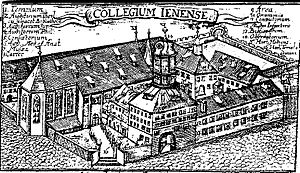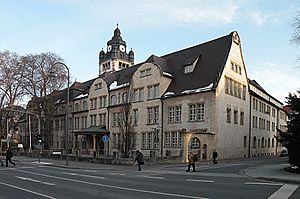University of Jena facts for kids
|
Friedrich-Schiller-Universität Jena
|
|
 |
|
| Latin: Universitas Litterarum Ienensis | |
| Type | Public |
|---|---|
| Established | February 2, 1558 |
| Budget | € 372 million |
| President | Andreas Marx |
|
Academic staff
|
3,415 |
|
Administrative staff
|
5,151 |
| Students | 18,219 |
| Location |
,
Thuringia
,
Germany
|
| Campus | University town |
| Affiliations | Coimbra Group EUA |
The University of Jena, officially known as the Friedrich Schiller University Jena, is a public university in Jena, Germany. A public university is funded by the government, so it can offer education to many people. It is one of the ten oldest universities in Germany, founded way back in 1558!
The university is named after the famous poet and writer Friedrich Schiller, who was a professor there. Over the years, many brilliant people have studied or taught at Jena. Six of them have even won the Nobel Prize, one of the highest awards in the world. The most recent was Herbert Kroemer, who won the Nobel Prize in Physics in 2000.
In its early days, the university was a major center for new ideas in philosophy, a subject that explores big questions about life and knowledge. Today, about 19,000 students attend the University of Jena.
Contents
History of the University
How It All Began
The idea for the university came from a German ruler named John Frederick of Saxony in 1547. He wanted to create a new center for learning. His three sons made his plan a reality, and the university officially opened on February 2, 1558.
The university became very famous in the late 1700s and early 1800s. This was its "golden age." Some of the most important thinkers in Germany taught here, including the poet Friedrich Schiller and the philosophers Johann Gottlieb Fichte, G. W. F. Hegel, and F. W. J. Schelling. The famous writer Johann Wolfgang von Goethe also helped support the university.
In the 19th century, the university became a leader in science. Professors like Ernst Haeckel taught about the theory of evolution. Haeckel's work was so important that he became as famous as Charles Darwin in some parts of Europe.
A Difficult Time in History
During the 1930s and 1940s, Germany was ruled by the Nazi party. This was a very difficult time for the country and the university. The government forced many excellent professors to leave their jobs. The university's main building and library were also badly damaged during World War II.
The University Today
After the war, the university was rebuilt. It formed a partnership with the famous technology company Zeiss, which helped it grow. Today, the Friedrich Schiller University is the only university in the state of Thuringia that teaches a wide variety of subjects.
The university works closely with other universities in Germany, like those in Halle and Leipzig. This allows students to take classes at different schools and gives professors a chance to work together on big research projects.
How the University is Organized
The university is divided into 10 different schools, called faculties. Each faculty focuses on a different area of study.
- Theology (the study of religion)
- Jurisprudence (the study of law)
- Economics and Business
- Humanities (subjects like history, languages, and philosophy)
- Social and Behavioural Sciences (like psychology and sociology)
- Mathematics and Computer Science
- Physics and Astronomy
- Chemical and Earth Sciences (like chemistry and geology)
- Biology and Pharmacy (the study of medicines)
- Medicine
Research and Discoveries
The University of Jena is a major center for research. Professors and students work on projects to discover new things in both science and the humanities. The university has special research groups that study everything from tiny living things called microbes to how light can be used in new technologies.
Jena is also a founder of the German Centre for Integrative Biodiversity Research (iDiv). This center studies how all the different forms of life on Earth work together. The university is the only one in Germany that has a special department for studying the theory of gravity and another for studying the Caucasus region of Eastern Europe.
Famous People from the University
Many famous people have studied or taught at the University of Jena over the centuries. Here are a few of them:
- Friedrich Schiller - A famous poet and playwright who taught philosophy at the university.
- Georg Wilhelm Friedrich Hegel - An important philosopher who was a professor at Jena.
- Karl Marx - A philosopher and economist who received his doctorate from the university.
- Gottlob Frege - A mathematician and philosopher who is considered one of the founders of modern logic.
- Carl Zeiss - An optician who started the famous Zeiss company and worked with the university.
- Ernst Haeckel - A biologist who created detailed drawings of animals and plants and promoted the theory of evolution.
- Herbert Kroemer - A physicist who won the Nobel Prize in 2000 for his work on technology used in cell phones and computers.
Museums and Collections
The university has several museums and collections that are open to everyone.
- The Phyletisches Museum shows the history of evolution.
- The Botanical Garden is one of the oldest in central Europe.
- The Mineralogical Collection has rocks and minerals, some from the collection of the writer Goethe.
- You can also visit Schiller's Garden House, where Friedrich Schiller lived, and a memorial to Goethe in the Botanical Garden.
Images for kids
See also
 In Spanish: Universidad de Jena para niños
In Spanish: Universidad de Jena para niños
- List of early modern universities in Europe
 | Shirley Ann Jackson |
 | Garett Morgan |
 | J. Ernest Wilkins Jr. |
 | Elijah McCoy |







